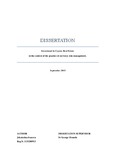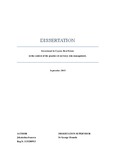| dc.contributor.advisor | Mountis, George | |
| dc.contributor.author | Ivanova, Jekaterina | |
| dc.date.accessioned | 2016-01-12T12:48:10Z | |
| dc.date.available | 2016-01-12T12:48:10Z | |
| dc.date.issued | 2015 | |
| dc.identifier.uri | http://hdl.handle.net/11728/7048 | |
| dc.description.abstract | Real estate investments as an industry has always been a domestic field, however, following many other asset categories, investments in real estate expands to the international level. The currency differs depending on where investments are made and as a result of this real estate investors also face currency risks in addition to all other real estate related risks they already need to manage. The management of currency risk can have different forms, and the purpose of this thesis is to find out how and if property purchasers in Cyprus hedge this risk. To create an understanding of the issue, a summary of some theories on the currency market and real estate market can be found in the thesis. Only a small amount of research exists on the subject in Cyprus and the theories are mainly from foreign studies and the currency risk management from other business sectors. These theories, combined with the research questions, have formed the questions for the interviews and questionnaire used in this research.
The present research shows that currency fluctuation risk does not affect a buyers’ willingness to purchase property in Cyprus. The hedging strategies used on the market seem to primarily be future contract approach and diversification.
The risk is well understood by property purchasers; however, it does not affect the property purchase in Cyprus. Most of the property purchasers have a basic understanding of the currency risk; nevertheless, the majority does not use any hedging vehicles. Most of the respondents held or currently hold investments in foreigner denominators. All the respondents stress the necessity of real estate intermediaries to have expertise in currency fluctuations risk.
Real estate market intermediaries suggest that in the recent years investors and individual buyers are more aware of this risk and keep it in mind when making decision to purchase property here in Cyprus. The significant role in this change of currency risk perception played rouble crash in the beginning of this year. The interviews also imply a shared idea of real estate intermediaries’ lack of knowledge in applying risk hedging strategies and difficulty to forecast any market perspectives. | en_UK |
| dc.language.iso | en | en_UK |
| dc.publisher | Real Estate Program, School of Architecture, Land and Enviromental Sciences, Neapolis University Pafos | en_UK |
| dc.rights | Απαγορεύεται η δημοσίευση ή αναπαραγωγή, ηλεκτρονική ή άλλη χωρίς τη γραπτή συγκατάθεση του δημιουργού και κάτοχου των πνευματικών δικαιωμάτων | en_UK |
| dc.subject | Research Subject Categories::FORESTRY, AGRICULTURAL SCIENCES and LANDSCAPE PLANNING | en_UK |
| dc.subject | real estate investments | en_UK |
| dc.subject | purchase property | en_UK |
| dc.subject | Cyprus | en_UK |
| dc.subject | maket perspectives | en_UK |
| dc.subject | currency risk management | en_UK |
| dc.title | Investment in Cyprus Real Estate in the context of the practice of currency risk management | en_UK |
| dc.type | Thesis | en_UK |


